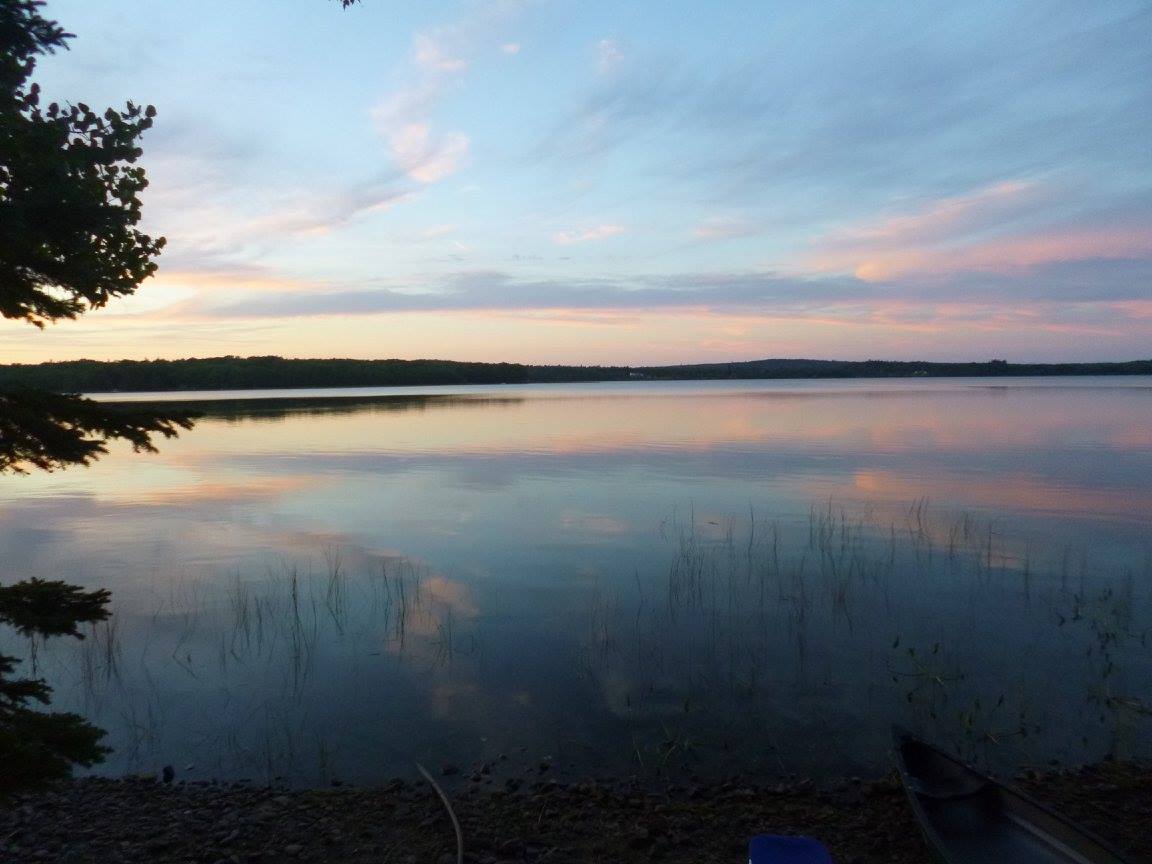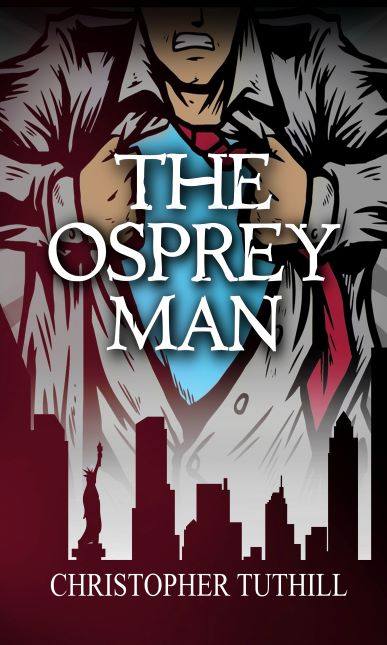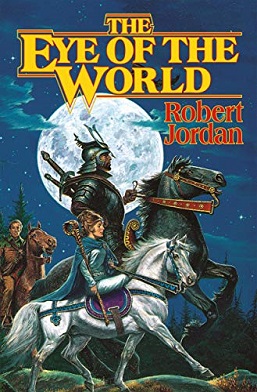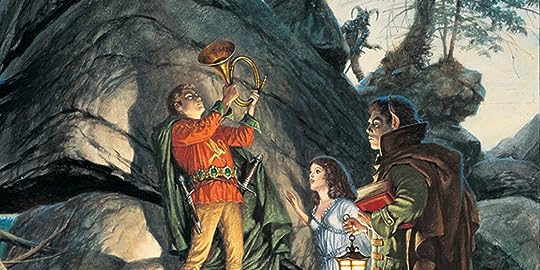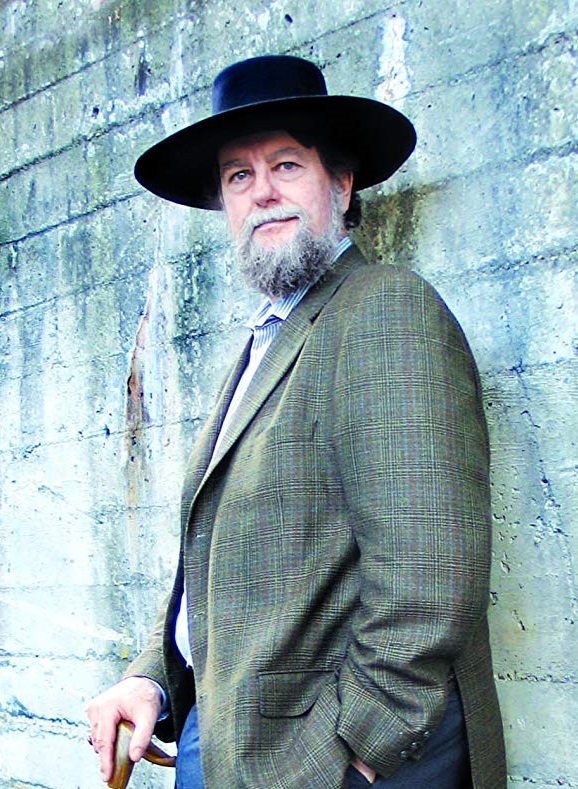I will be at the Barnes and Noble in Poughkeepsie, NY on Saturday, April 27 at 2pm for a book talk and with copies of THE OSPREY MAN. It’s sure to be a fun time! Bring a friend, grab a coffee, and stay for some storytelling.
Category: Reading
Rereading The Wheel of Time
“The Wheel of Time turns, and ages come and pass, leaving memories that become legend. Legend fades to myth, and even myth is long forgotten when the Age that gave it birth comes again. In one Age, called the Third Age by some, an Age yet to come, an Age long past, a wind rose in the Mountains of Mist. The wind was not the beginning. There are neither beginnings nor endings to the turning of the Wheel of time. But it was a beginning.”
― Robert Jordan, The Eye of the World
So begins Robert Jordan’s fourteen-book, 4.4 million word saga, The Wheel of Time, a tale which has sold over ninety million copies since the first novel in the series was published in 1990.
Some three decades ago, or an age ago, in Wheel terms, when I was in high school and college, I happily devoured the first four books in Robert Jordan’s high fantasy series. It hit me at exactly the right time; I had recently read The Lord of the Rings and was constantly on the lookout for more epic fantasy. Jordan’s story fit the bill, and I enjoyed every minute I spent in his world.
As the series went on, I became disappointed with the next two or three books and eventually gave up on them. For me, what started out as an excellent fantasy adventure tale that was heading in a satisfying, if not entirely original direction became bogged down with an unwieldy plot and too many characters. Each new installment of the series introduced more plot elements, settings and people until I stopped seeing the heroes like Rand, Moiraine, Perrin, Egwene, Matt and the rest of the cast of characters that had started out on such a promising adventure in The Eye of the World.
My friends who were fantasy aficionados felt the same way. By the time the later installments of the books came out, I had moved on and lost interest. There were always plenty of other books to read, and other fantasy worlds to explore by writers like Tad Williams, Ursula LeGuin, and many others I was busy discovering. When new Jordan books arrived, I was interested in them but not tempted enough to buy and read them. I’d already spent thousands of pages with The Wheel of Time, and it seemed there was no end in sight.
When I saw that amazon was adapting the Wheel of Time, I thought it might be a good chance for them to tighten up this story a bit, maybe streamline things and tell a rousing tale. I watched season one with great hope but did not really enjoy it. However, I did go back to read The Eye of the World and The Great Hunt, books one and two of the series.
I’m happy to say that after thirty years, these first two installments hold up well. I had forgotten most of the plot over three decades, but I very much enjoyed Jordan’s setup in the Shire-like Two Rivers, the flight from the Myrddraal and the Trollocs, and the slow unveiling of the truth of Rand’s destiny. The magic system is well developed: female wizards wield a magical force called The One Power and must train for years to do it. The philosophical underpinnings of the Wheel, where the world is in a continuous cycle of history, were a fun innovation for the fantasy genre that gave the setting plenty of depth, to my mind.
For me, some of this story aged less well, specifically the adolescent romantic longings of the main characters. I guess I was ok with this kind of thing when I was a teen and in my early twenties, but such doe-eyed yearning was not exactly to my taste this time around. But I let it go, because the story is fun and engaging enough to keep me interested.
What I also found striking in my re-read was the all-female wizardry of the Aes Sedai. They are a powerful order, akin to the Bene Gesserit of Dune. The political maneuverings of their different classes allow for plenty of intrigue and some great plot twists. The idea that men have tainted the One Power is also reminiscent of LeGuin’s Earthsea books.
I could do with less of Jordan’s at times florid descriptions of how gorgeous and powerful some of these women are, though–he lays it on thick at times. In The Great Hunt there is a sequence where some evil women of the Seanchan, an invading army, have leashed and enslaved Aes Sedai and other women who can wield the One Power. I’m not sure the story needed this sadistic plot point, but I guess Jordan had his reasons.
Clearly, plenty of readers disagree with my criticisms, and loved the entire cycle, including the final three books, finished posthumously by the amazingly prolific Brandon Sanderson. It’s sad that Jordan didn’t live to finish the series, but it seems he had a good steward to bring to to its conclusion.
I enjoyed re-reading these two books very much, partly for nostalgia’s sake, but also because they’re a lot of fun. The Great Hunt has a particularly stirring climax, where Rand and his friends face impossible odds as they pursue an ancient, magical horn that will call back legendary heroes of a past age. There are some engaging action sequences with high stakes for everyone involved. Rand, who now knows he is The Dragon Reborn, the great hero on which the hope of the world rests, must fight a demonic being to save his friends. The different creatures and races in the book are also quite well described and evocative. Some of the nightmarish dream sequences, in which Rand and his friends face their darkest fears, brought on by the evil beings that are hunting them down, are well told and gripping. Like Herbert and Tolkien, Jordan took a lot of care in creating these alien societies, and they’re quite detailed and consistent. Jordan had a lot of panache in telling these stories, and it’s easy to see why so many fans stuck with him. Maybe I’ll make it all the way through to the end, this time.
It does seem clear by the end of book two, though, the direction in which this story is moving, so I’m unsure why this series could not have reached a perfectly satisfying conclusion in three or four books. That’s just one reader’s opinion, and others have felt differently, but with so many other good books to read, I can’t say with certainty that I’ll read the other twelve books in this series. Maybe this summer I’ll dive back in for The Dragon Reborn.
T.S. Eliot
T.S. Eliot was born September 26, 1888, 135 years ago. The Love Song of J. Alfred Prufrock, first published in June 1915, is a groundbreaking work that left me floored when I first encountered it as a young man. Wonderful, evocative, elegaic, just beautiful. I committed much of it to memory and read all of his work, which I revisit often.
I’m not going to parse the poem here; many learned scholars have done so over the past hundred and eight years. What I will say is that as an eighteen year old, I read this poem and was deeply moved. It was not like any poem I’d read before. Among many memorable images, Eliot writes:
“I have seen the eternal Footman hold my coat, and snicker,
And in short, I was afraid.”
I think this and much of this work speaks for itself and needs no intermediary. I knew as a teenager what Eliot was getting at, felt it in my soul, and still remember that unsettling, exciting moment, and feel it just as keenly over thirty years later.
Happy reading, my friends.
The Love Song of J. Alfred Prufrock
S’io credesse che mia risposta fosse
A persona che mai tornasse al mondo,
Questa fiamma staria senza piu scosse.
Ma perciocche giammai di questo fondo
Non torno vivo alcun, s’i’odo il vero,
Senza tema d’infamia ti rispondo.
Let us go then, you and I,
When the evening is spread out against the sky
Like a patient etherised upon a table;
Let us go, through certain half-deserted streets,
The muttering retreats
Of restless nights in one-night cheap hotels
And sawdust restaurants with oyster-shells:
Streets that follow like a tedious argument
Of insidious intent
To lead you to an overwhelming question …
Oh, do not ask, “What is it?”
Let us go and make our visit.
In the room the women come and go
Talking of Michelangelo.
The yellow fog that rubs its back upon the window-panes,
The yellow smoke that rubs its muzzle on the window-panes
Licked its tongue into the corners of the evening,
Lingered upon the pools that stand in drains,
Let fall upon its back the soot that falls from chimneys,
Slipped by the terrace, made a sudden leap,
And seeing that it was a soft October night,
Curled once about the house, and fell asleep.
And indeed there will be time
For the yellow smoke that slides along the street,
Rubbing its back upon the window-panes;
There will be time, there will be time
To prepare a face to meet the faces that you meet;
There will be time to murder and create,
And time for all the works and days of hands
That lift and drop a question on your plate;
Time for you and time for me,
And time yet for a hundred indecisions,
And for a hundred visions and revisions,
Before the taking of a toast and tea.
In the room the women come and go
Talking of Michelangelo.
And indeed there will be time
To wonder, “Do I dare?” and, “Do I dare?”
Time to turn back and descend the stair,
With a bald spot in the middle of my hair—
They will say: “How his hair is growing thin!”
My morning coat, my collar mounting firmly to the chin,
My necktie rich and modest, but asserted by a simple pin—
They will say: “But how his arms and legs are thin!”
Do I dare
Disturb the universe?
In a minute there is time
For decisions and revisions which a minute will reverse.
For I have known them all already, known them all:—
Have known the evenings, mornings, afternoons,
I have measured out my life with coffee spoons;
I know the voices dying with a dying fall
Beneath the music from a farther room.
So how should I presume?
And I have known the eyes already, known them all—
The eyes that fix you in a formulated phrase,
And when I am formulated, sprawling on a pin,
When I am pinned and wriggling on the wall,
Then how should I begin
To spit out all the butt-ends of my days and ways?
And how should I presume?
And I have known the arms already, known them all—
Arms that are braceleted and white and bare
But in the lamplight, downed with light brown hair!
It is perfume from a dress
That makes me so digress?
Arms that lie along a table, or wrap about a shawl.
And should I then presume?
And how should I begin?
Shall I say, I have gone at dusk through narrow streets
And watched the smoke that rises from the pipes
Of lonely men in shirt-sleeves, leaning out of windows?…
I should have been a pair of ragged claws
Scuttling across the floors of silent seas.
And the afternoon, the evening, sleeps so peacefully!
Smoothed by long fingers,
Asleep … tired … or it malingers,
Stretched on the floor, here beside you and me.
Should I, after tea and cakes and ices,
Have the strength to force the moment to its crisis?
But though I have wept and fasted, wept and prayed,
Though I have seen my head grown slightly bald brought in upon a platter,
I am no prophet—and here’s no great matter;
I have seen the moment of my greatness flicker,
And I have seen the eternal Footman hold my coat, and snicker,
And in short, I was afraid.
And would it have been worth it, after all,
After the cups, the marmalade, the tea,
Among the porcelain, among some talk of you and me,
Would it have been worth while,
To have bitten off the matter with a smile,
To have squeezed the universe into a ball
To roll it toward some overwhelming question,
To say: “I am Lazarus, come from the dead,
Come back to tell you all, I shall tell you all”—
If one, settling a pillow by her head,
Should say: “That is not what I meant at all.
That is not it, at all.”
And would it have been worth it, after all,
Would it have been worth while,
After the sunsets and the dooryards and the sprinkled streets,
After the novels, after the teacups, after the skirts that trail along the floor—
And this, and so much more?—
It is impossible to say just what I mean!
But as if a magic lantern threw the nerves in patterns on a screen:
Would it have been worth while
If one, settling a pillow or throwing off a shawl,
And turning toward the window, should say:
“That is not it at all,
That is not what I meant, at all.”
No! I am not Prince Hamlet, nor was meant to be;
Am an attendant lord, one that will do
To swell a progress, start a scene or two,
Advise the prince; no doubt, an easy tool,
Deferential, glad to be of use,
Politic, cautious, and meticulous;
Full of high sentence, but a bit obtuse;
At times, indeed, almost ridiculous—
Almost, at times, the Fool.
I grow old … I grow old …
I shall wear the bottoms of my trousers rolled.
Shall I part my hair behind? Do I dare to eat a peach?
I shall wear white flannel trousers, and walk upon the beach.
I have heard the mermaids singing, each to each.
I do not think that they will sing to me.
I have seen them riding seaward on the waves
Combing the white hair of the waves blown back
When the wind blows the water white and black.
We have lingered in the chambers of the sea
By sea-girls wreathed with seaweed red and brown
Till human voices wake us, and we drown.
Asimov’s Foundation
I loved Isaac Asimov’s Foundation series when I first read it as a teen. It’s still one of my all time favorite science fiction series–it imprinted on me at a young age, before I had read very much, but it holds up quite well. Asimov’s later installments, in which he revisited and added to the series, were great too.

I’m not setting out to review the books right now, nor the new, slick production from Apple TV. What I will say about the show, after watching a couple episodes and then giving up, is that it must take some gargantuan ego or confidence to change such a classic work until it’s unrecognizable, and still call it Foundation. I have no idea where the show is going and didn’t care much after what I’ve watched. The production is expensive and looks cool and the actors are quite talented but the story was so different from what I read that it seemed strange to say it’s based on Asimov. Aside from the title and the most general plot setup, it wasn’t. It seems I’m in the minority, and many people love it, but that’s my opinion. I’ll probably just re-read Foundation instead.
Call me old fashioned; I don’t mind. Books don’t always need expensive adaptations. This series seemed ripe for such a show, but it wasn’t to my taste at all.
THE OSPREY MAN SALE
THE OSPREY MAN is just $12 right now, through June 30, with free shipping from my publisher. It’s $5.99 as an ebook, or you can contact me for a signed copy. Read the reviews here–this coming of age tale is great read for a young person in your life, or for general readers.
World Read Aloud Day
Today, February 1, is “World Read Aloud Day,” a program in which people are encouraged to read stories to an audience. I was happy to participate, and read to an audience of eager and enthusiastic sixth graders. It was a really neat event. I read a chapter of my book, and then answered some great questions from the students. They wanted to know how long it takes to write a book, how hard I thought it was, what other things I had written, what stuff I like to read, and lots of other things. It was a hoot!
For any reading or writing teachers out there, I am more than happy to do this for your class via zoom. Just send me a message. There’s nothing better than helping kids get excited to explore new worlds through reading.
